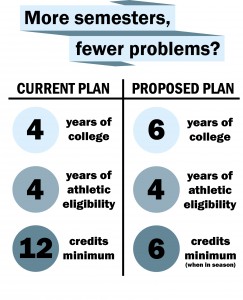
(Designed by Kelly McCoy)
Two years ago, the University of North Carolina proposed a plan to allow their student athletes to take fewer credit hours in order to focus on their sports more.
Under this new plan, athletes would have to stay at their designated college for a total of six years, but would still only have eligibility to play for four. Because of their schedules, the faculty at North Carolina hoped this would help students excel in both their academics and sports more efficiently.
Steven King, an assistant professor of journalism and communication at UNC, said the football players at his school supported this new idea as long as their scholarships would cover the extra two years that they would be attending the university.
They further supported this proposal by saying it would allow student athletes to take harder classes with more outside work or projects.
More recently, another article was published by the Chronicle of Higher Education, reviewing how this proposal is being taken by athletes, as well as coaches and other faculty and staff members. In the article, it states the NCAA already provides a lot of flexibility for student athletes academically, and they are afraid that by putting this proposal into practice in other Division I institutions across the country, they would be sending the wrong message.
This fear is similar to that of the Big 12 commissioner Bob Bowlsby, as well as Douglas Strange, the assistant athletic director for campus athletics and strength and conditioning at Lehigh.
“You are a student first,” Strange said. “Athletes know what they are signing up for. I do not think the demands are any different than they have been in the past, it is just about how you go about managing your time,”
He said instead of dropping their credit levels, they should understand the time commitments these student athletes have and try to help them manage it. He says coaches already have conversations with their players to help them build their schedules so they’re most efficient.
“It is hard for me to fathom that athletes and parents would even want to be in school for that long, just to get an undergraduate degree,” Strange said. “We should always be academics first, sports second.”
In a survey by the NCAA asking athletes what they would want to see change in their college athletic careers, the majority answered having more downtime during and right after their season ends. And many coaches agree with their athletes on this issue.
However, for sports such as football and basketball, the coaches tend to be less supportive of this because of the financial pressures that are already set into place and because of contracts set into place by media companies that cover them. These pressures also depend on the school and are often much larger for bigger schools such as UNC.
Strange also said the athletes’ long-term goals past college affect this.
“What is your end goal?” Strange said. “Professional sports? How is six years of college going to get you there? Sports definitely help build character and adds to the college experience, but by no means is it a first priority over education.”
Valerie Lauer, a junior on the Lehigh women’s swim team, agrees with Strange.
“I do not think it benefits the majority of athletes in the long run,” Lauer said. “As tough as it is to be a Division I athlete in season juggling athletics and academics, I think that it keeps my day more structured which ultimately helps me perform at my best both academically and athletically.
“I also feel like taking six years to graduate is a huge financial burden and that it sets you back in terms of competing for jobs after college.”
Some athletes at Lehigh see this situation as one that has both pros and cons and is a little more difficult to interpret. Among these athletes is Shannon Dennington, a senior on the women’s rowing team.
“I think it is tricky,” Dennington said. “I know I missed out on a lot of other activities being on the team, but it also gave me more opportunities and resources. However, I never blamed any of my academic struggles on athletics because I was always given the resources to handle it.”
Dennington added that despite this feeling, she equates being on the team to having a full-time job and would like to have some free time to study and work on other assignments.
As of now, none of these proposals has been implemented or even discussed at Lehigh, but the notion sheds light onto some of the difficulties Division I student athletes deal with on a regular basis.





Comment policy
Comments posted to The Brown and White website are reviewed by a moderator before being approved. Incendiary speech or harassing language, including comments targeted at individuals, may be deemed unacceptable and not published. Spam and other soliciting will also be declined.
The Brown and White also reserves the right to not publish entirely anonymous comments.